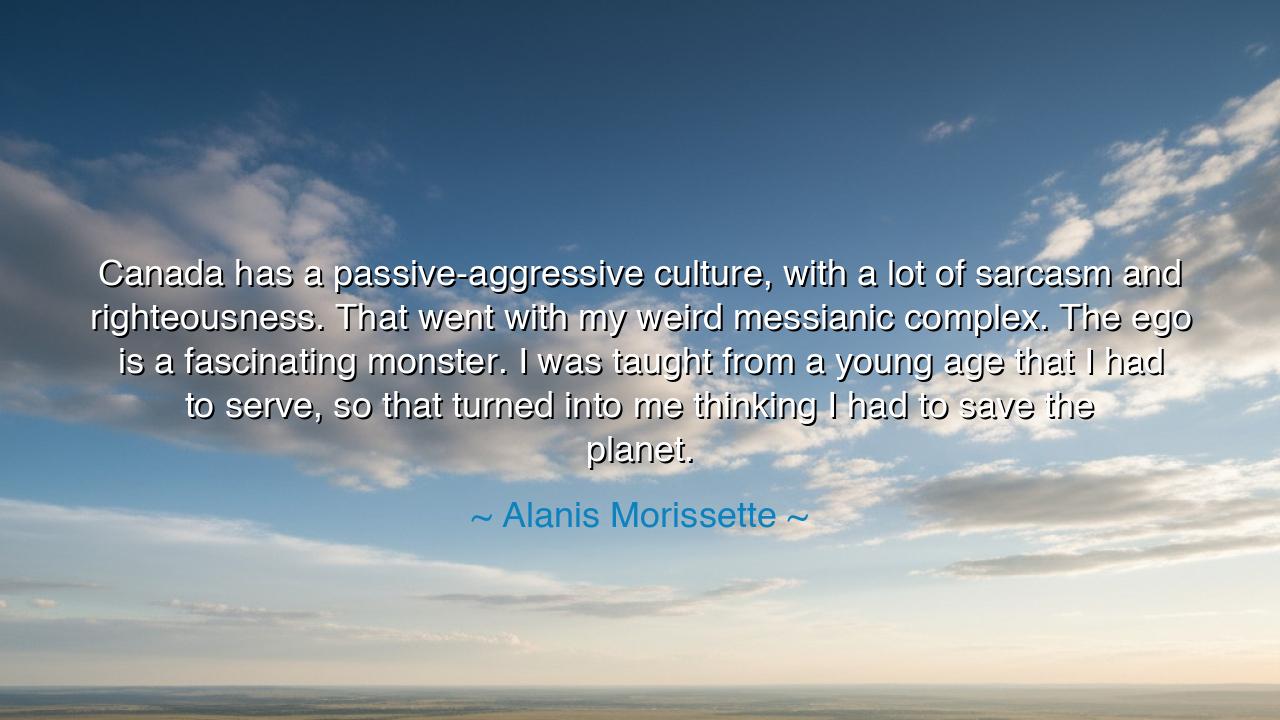
Canada has a passive-aggressive culture, with a lot of sarcasm
Canada has a passive-aggressive culture, with a lot of sarcasm and righteousness. That went with my weird messianic complex. The ego is a fascinating monster. I was taught from a young age that I had to serve, so that turned into me thinking I had to save the planet.






In the tapestry of human culture, there are threads of complexity and contradiction, where the forces of ego and selflessness intertwine in ways that confuse and challenge even the wisest among us. The words of Alanis Morissette, “Canada has a passive-aggressive culture, with a lot of sarcasm and righteousness. That went with my weird messianic complex. The ego is a fascinating monster. I was taught from a young age that I had to serve, so that turned into me thinking I had to save the planet,” speak to this paradox, a revelation that lays bare the internal struggles of a soul caught between the call of self and the obligation to the greater good.
What then does it mean to speak of a passive-aggressive culture? In the land of the maple leaf, where politeness is often revered above all, there exists an undercurrent of quiet resistance, a subtle form of dissent hidden behind a veneer of civility. Sarcasm flows like an invisible river beneath the surface of everyday interaction. It is a culture where one can nod and smile, and yet, at times, harbor within them a deep sense of unspoken defiance. Morissette’s words ring with the weight of this duality—a culture that, on the outside, appears to embody peace and harmony, while beneath it, there is a simmering tension, an unresolved conflict between what is said and what is truly felt.
In the same breath, Morissette reveals her personal battle with what she calls her “weird messianic complex”—a psychological burden that led her to believe that her mission in life was to save the world. It is a complex that many of us may feel at one point or another in our lives, especially when we are raised to believe that our purpose is to serve others, to sacrifice our own desires for the betterment of the whole. This messianic complex is not simply about wanting to help; it is about believing that the fate of the world lies upon one’s shoulders, that one is the lone savior in a sea of suffering.
Consider, if you will, the story of the ancient Greeks, who believed in the power of the heroic figure, the individual who was chosen to stand alone against the forces of chaos and destruction. Heracles, the mighty son of Zeus, undertook twelve labors, each more perilous than the last, in an attempt to cleanse the world of its impurities. Though he sought to serve the gods and bring order to the world, his journey was marked by personal sacrifice and the constant tension between his duty and his humanity. Like Heracles, Morissette’s struggle speaks to the weight of self-imposed responsibility, where the desire to serve others can sometimes evolve into the belief that one’s purpose is to rescue others from their own flaws, without ever considering the toll it takes on the self.
The ego, as Morissette wisely notes, is a “fascinating monster.” It is the quiet voice that pushes us to think we are chosen, that we are destined for something greater, something more important. But the ego is not always our ally; it can deceive us, inflating our sense of importance and leading us to believe that we are the ones who must carry the world’s burden. History has shown that the most tragic figures are often those who are consumed by their own sense of grandiosity, from the ancient kings who sought to rule the world to the more recent figures who, despite their good intentions, have been led astray by their own sense of divine mission.
Yet, Morissette’s words also point to a profound lesson: the act of serving others, of giving oneself to a greater cause, is noble, but it must be tempered with humility and an understanding of one’s own limitations. One cannot save the planet alone. The world’s ills cannot be healed by the actions of a single person, no matter how pure their intentions. To believe otherwise is to place the weight of the world upon one’s fragile shoulders, only to collapse under its overwhelming force. The true art of service lies not in attempting to save others, but in offering what we can without losing ourselves in the process.
The lesson, then, is one of balance. It is the recognition that service to others and self-care are not opposing forces but complementary aspects of a well-lived life. We must give to others, but we must also recognize when our own ego is pushing us toward extremes, when our desire to help has morphed into a desire to control. To serve with a pure heart is to know when to step back, to recognize that the world does not rest solely on our shoulders, and that it is the collective effort of many that leads to true change.
Let us, therefore, take heed from Morissette’s revelation. Let us serve, but let us do so with awareness. Let us work toward the betterment of the world, but not at the cost of our own peace and balance. The world does not need saviors who carry its weight alone, but partners who work together, recognizing both the power and the limitations of the individual. Only then can we find the strength to truly serve without being consumed by the very ego we seek to transcend.






AAdministratorAdministrator
Welcome, honored guests. Please leave a comment, we will respond soon